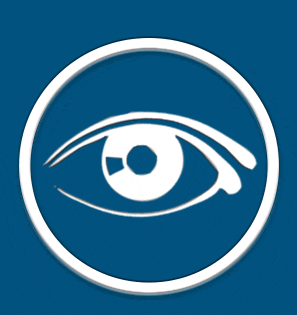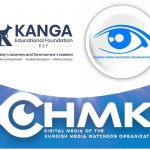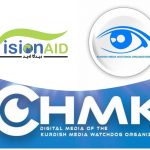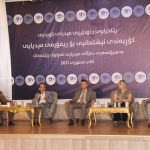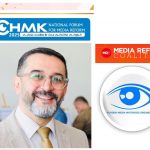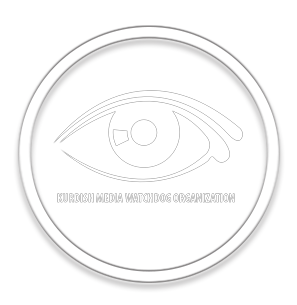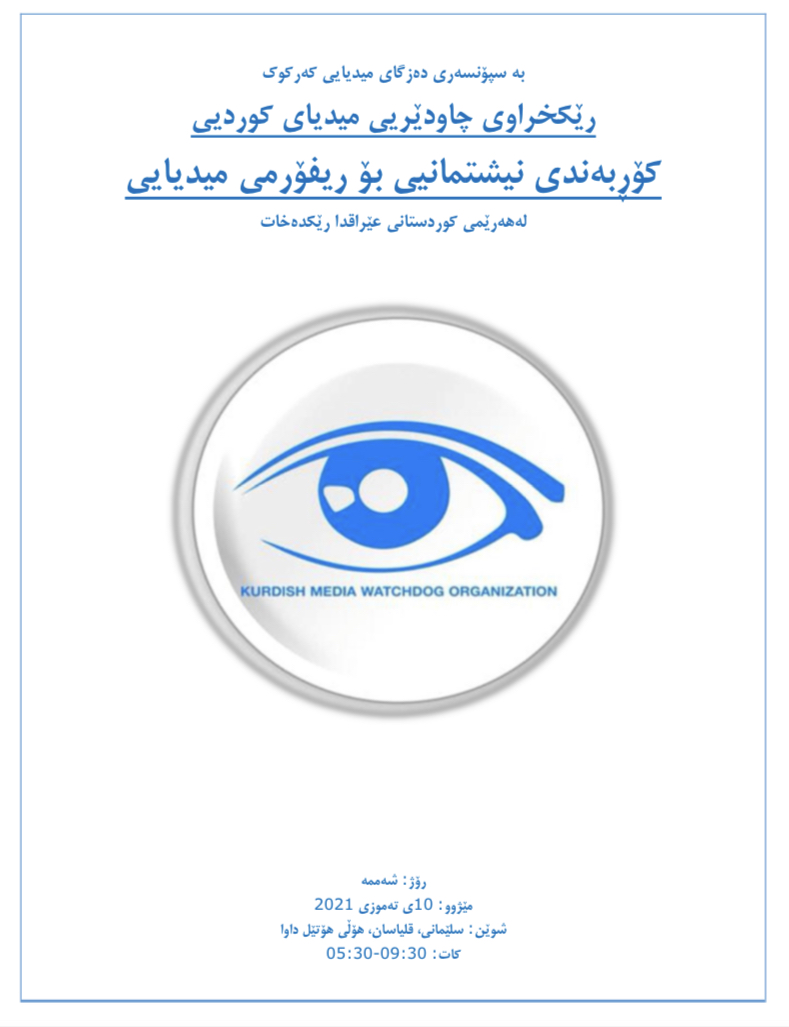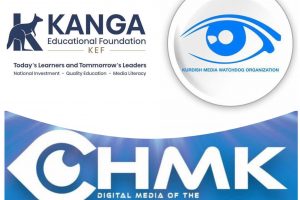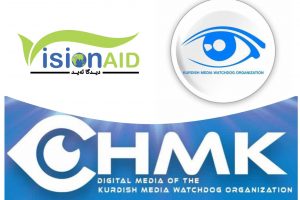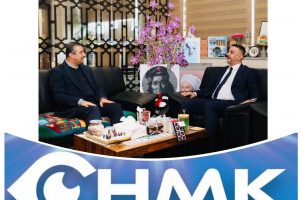CHMK, Sulaimani— The Kurdish Media Watchdog Organisation (CHMK), with the support of the Kirkuk Media Agency, convened the First CHMK National Forum on Media Reform in the Kurdistan Region of Iraq on Saturday, July 10, 2021, at Dawa Hall in Sulaimani. The event brought together approximately 200 participants and featured 14 panellists across four main sessions. Over the course of the eight-hour forum (from 09:30 to 17:30), discussions focused on four core themes, culminating in a series of recommendations—some of which were formally submitted to the relevant authorities.
Recommendations on Media Reform: Party Centralization vs. Decentralization
- Promotion of Decentralisation and Professional Reform: Political parties in the Kurdistan Region of Iraq are urged to grant greater professional autonomy to their affiliated media outlets. This includes fostering internal and external media reform through comprehensive political, economic, and social reforms, particularly via their parliamentary, governmental, and judicial representatives. Ensuring the separation and independence of the three branches of power should be a foundational step toward relinquishing centralised control over party media, thereby supporting a freer media environment and reinforcing journalism’s role as a democratic watchdog—serving public interest rather than partisan agendas.
- Shifting from Partisan to Professional Standards: Political parties should reduce ideological influence in their media operations and promote adherence to professional journalistic standards. When gathering, drafting, and publishing news—whether related to party activities or external events—professional integrity should override partisan interests. Media professionals must be encouraged to act with ethical responsibility and editorial independence.
- Support for Independent Media Unions: Political parties should refrain from interfering with independent professional unions, including journalists’ syndicates, and should instead support the establishment and functioning of autonomous organisations representing media professionals.
- Enforcement of Existing Media Laws: Through their legislative, executive, and judicial representatives, political parties must advocate for the strict enforcement of existing media-related laws—specifically Law No. 11 of 2013 (Right to Access Information) and Law No. 35 of 2007 (Journalism Law). These measures aim to combat the spread of misinformation, protect journalists from imprisonment, and prevent the arbitrary closure or censorship of media outlets.
- Unified Media Messaging During Critical Times: Political parties should adopt a unified media approach during times of national crisis, war, conflict, or electoral campaigns. A national standard for responsible media conduct should be established to prevent violations of privacy, character defamation, and disrespect toward national symbols and cultural values.
Recommendations on Media Reform: Legal Regulation and Professional Standards
- The Kurdistan Parliament should undertake a comprehensive review of existing media- and journalism-related legislation. This includes harmonising overlapping or conflicting provisions and consolidating them into a new, coherent legal framework. Key examples include the Law on the Misuse of Communication Devices and the draft bill on Electronic Media and Social Networks. Additional legislation is urgently needed to regulate media structure, content, and ownership—such as the proposed Broadcast Media Law and Privacy Law—which should be drafted and enacted without delay.
- The Parliament is urged to enact legislation establishing a “National Council for Media and Communications”. This independent body would serve to promote media literacy, conduct professional assessments, and oversee the legal regulation of journalism, internet content, and communication networks within the Kurdistan Region of Iraq.
- The Kurdistan Parliament and Government must implement legal and regulatory measures to prevent the improper use of the Kurdish language in media. This should include official guidelines that distinguish between dialects, formal and informal usage, and regional variations, promoting the correct application of the Kurdish language in both spoken and written form. Media outlets should be required to appoint linguistic consultants to ensure compliance and preserve language integrity.
- Media institutions in the Kurdistan Region should develop and adhere to a formal code of professional ethics, aligned with the Journalistic Integrity Charter, to prevent misuse of the media and its messages. This would enhance responsible journalism and support the effective exercise of freedom of expression and press freedom.
- Journalists and media institutions should work to revitalize the Kurdistan Union of Journalists by convening a representative congress. The union must be repositioned as an independent body representing the interests of media professionals, rather than acting under the influence of political parties or non-professional agendas.
Recommendations on Media Reform in the Context of Education and Higher Education
- The Ministries of Education; Higher Education and Scientific Research; Endowments and Religious Affairs; and Culture and Youth should collaborate to develop a comprehensive educational programme titled “Media Awareness” to be integrated into the curricula of kindergarten, primary, and secondary schools. Simultaneously, measures should be taken to prohibit the misuse of religious platforms and media outlets for issuing threats, insults, or baseless accusations against individuals—whether secular or spiritual.
- The Ministry of Higher Education and Scientific Research is urged to conduct an in-depth evaluation and restructuring of academic programmes in media, marketing, and public relations across diploma, undergraduate, postgraduate, and doctoral levels. These programmes should be aligned with contemporary challenges in media education and emphasise interdisciplinary learning and research that integrates media with other relevant academic fields.
- Media institutions should prioritise the recruitment of graduates from departments such as Media, Media Technology, Digital Media, and Marketing and Public Relations in order to bridge the gap in the media labour market and benefit from the specialised skills of media professionals. Concurrently, continuous training programmes should be introduced to promote professional development and legal literacy among working journalists.
- The Kurdistan Union of Journalists must clearly define the rights and responsibilities of journalists and ensure equal recognition for professionals in both digital and traditional media. Membership criteria should be strictly reviewed to retain only those whose primary career and income are based on journalism. Furthermore, the integration of journalistic service into the civil service system should be reinstated to protect journalists’ labour rights and entitlements.
- Digital media platforms should enhance their professional standards by improving the use of internet-based tools such as hyperlinks, multimedia integration, and interactive content that combines sound, colour, and text. Greater focus should be placed on covering social and political issues with depth and accuracy, particularly by addressing the roots of extremism and proposing practical solutions through responsible journalism.
Recommendations on Media Reform: Balancing Censorship and Freedom in the Work Environment
- It is essential for the legislative, executive, and judicial branches to rigorously oversee the enforcement of relevant laws, including the Journalism Law No. 35 of 2007 and the Right to Information Law No. 11 of 2013, and to ensure appropriate prosecution of journalists when warranted. Additionally, establishing a dedicated court for journalists and media-related offences is crucial to prevent individuals accused of misusing freedom of expression from being processed alongside other criminals. Furthermore, cases involving the assassination of journalists must be promptly investigated, with swift accountability for the perpetrators.
- The Ministry of Culture and Youth should conduct a comprehensive review of policies concerning channel frequency regulation, registration procedures, ownership protocols, publication quotas, and all matters pertaining to media content and form, with the objective of expanding freedoms of expression and press.
- Media organisations should employ specialised advisors—media, legal, educational, and psychological experts—tasked with reviewing politically, legally, economically, and socially sensitive content such as films, dramas, and journalistic articles published daily.
- Local governments must enhance mechanisms to implement the provisions of Law No. 11 of 2013 on the Right to Information by strengthening the roles of spokespersons and information offices across all departments and directorates.
- Security forces within the Ministries of Interior and Peshmerga should engage with journalists professionally during protests and crisis situations, respecting the independence of the journalistic profession. Police stations and courts must avoid treating journalists as criminals, particularly during warnings or temporary detentions.
Associate Professor Dr Shwan Adam Aivas
General Coordinator of the CHMK National Forum on Media Reform
Kurdistan Region of Iraq, Sulaimani
Dawa Hotel Hall,
10 July 2021
